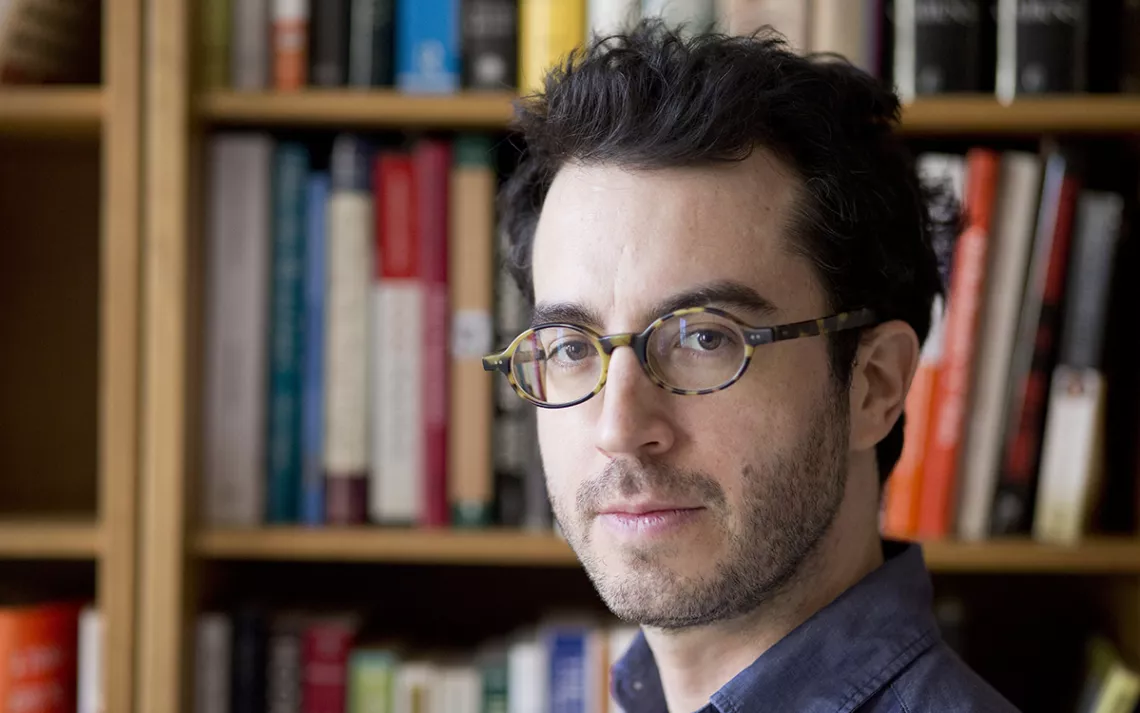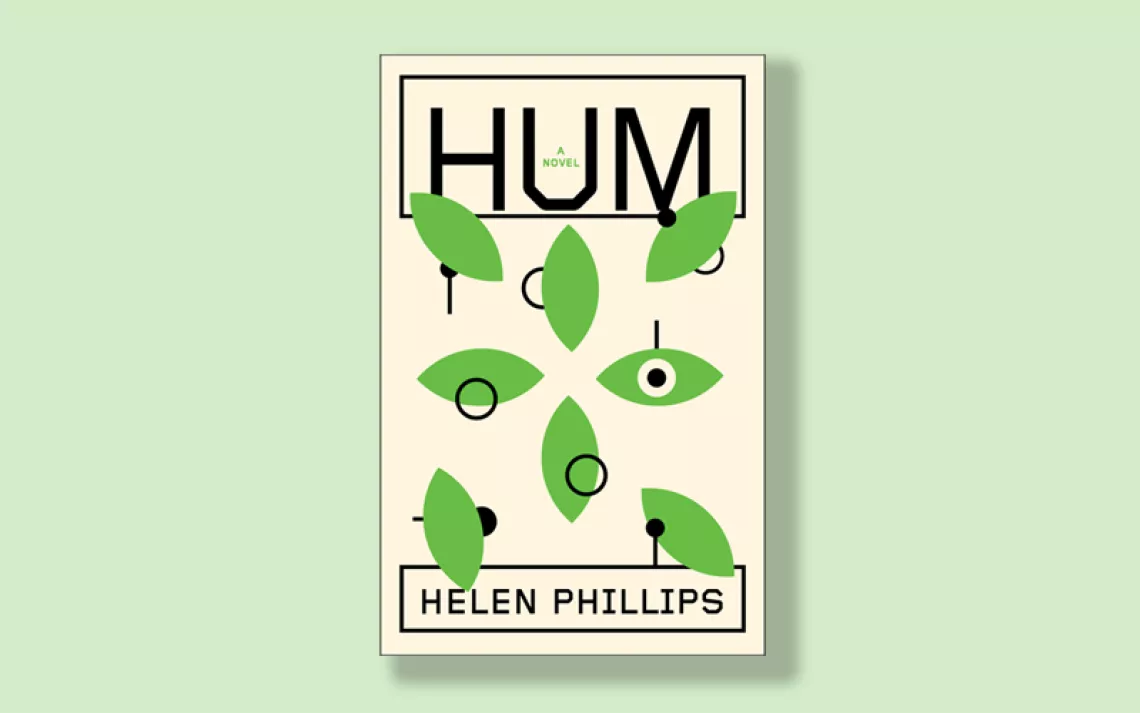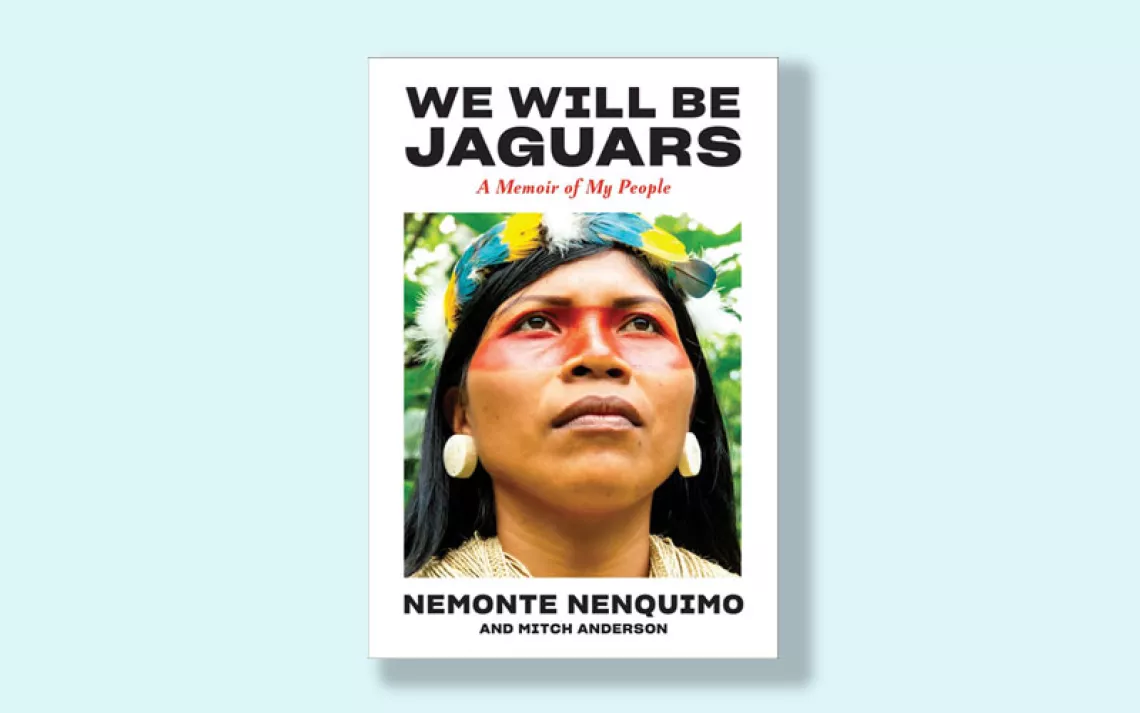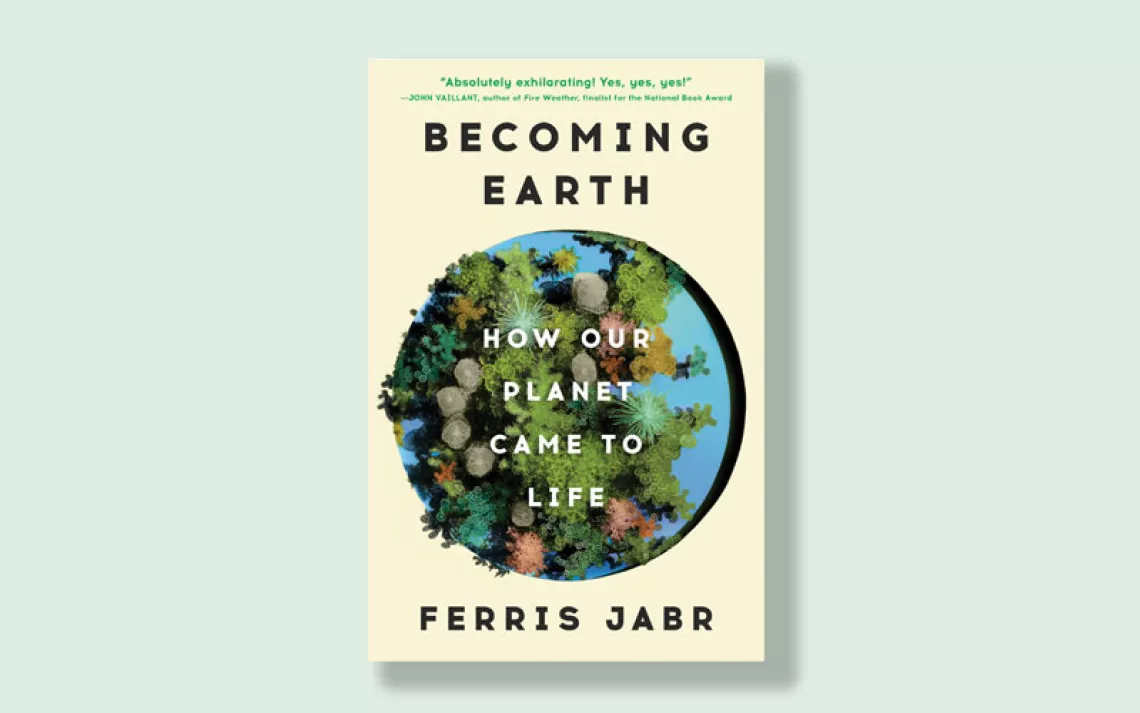Jonathan Safran Foer's Manifesto
“We Are the Weather” gets honest about the eco-sinners' struggle

Author Jonathan Safran Foer | Photo by Jeff Mermelstein

“If a cabal of evil psychologists had gathered in a secret undersea base to concoct a crisis humanity would be hopelessly ill-equipped to address,” wrote Oliver Burkeman in The Guardian, “they couldn’t have done better than climate change.”
That quote effectively launched the latest from novelist Jonathan Safran Foer (Extremely Loud & Incredibly Close, Everything Is Illuminated). The genesis of We Are the Weather: Saving the Planet Begins at Breakfast, out this month from FSG, traces back to 2017, when Foer attended Colorado’s Telluride Film Festival for the documentary premiere of Eating Animals—based on Foer’s best-selling meditation on what it means to consume animals in an industrialized world—and found himself chatting with Evan Williams, one of the founders of Twitter.
“We were talking about our critical moment in history—when there’s this very strong desire to do the right thing, and a huge amount of energy coming from student communities and religious groups and individuals who are increasingly talking about the environment—but how the right thing still isn’t happening,” the author told Sierra. “There’s this chasm between what we know—that global warming is a human-caused catastrophe—and what we do, and it’s really puzzling. So many people I know feel this way, and we can’t really explain it. I’m a pretty informed and progressive person, and yet I’ve done virtually nothing to alter the causes of the crisis. And there are a lot of good reasons for that—it doesn’t come down to people being ignorant or evil; it’s a uniquely difficult problem to address, psychologically, and emotionally.”
Foer set out to connect the dots between individual actions—the forces that drive humans to make the choices we make and act the way we do—and systemic change. While the current cultural conversation seems squarely focused on the latter, Foer’s 224-page mashup of personal storytelling, science journalism, historical exploration, and experimentation with form (the author periodically goes into screenplay mode to wage an ongoing argument with himself) is here to remind us that structural change isn’t happening quickly enough. The result is an artful—and convincing— exploration of how we as individuals can best move the needle on climate action, shift behavioral norms, and perhaps most importantly, feel better about life during fraught, warming times.
Foer lands on a proposal familiar to fans of Eating Animals—that abstaining from animal products for two meals a day (along with flying and driving less, and having fewer children) is our surest avenue to preventing and mitigating global warming. “We must either let some eating habits go or let the planet go,” he writes. “Food is different because of how everyday it is, because of how unconstrained our choices are, and also because it’s the only one of those four things that addresses methane and nitrous oxide, which are the most urgently important greenhouse gases to deal with.”
Sierra sat down with Foer—the rare vegetarian evangelist who will also cop to sneaking burgers on a book tour—in a cafe near where he teaches writing on Manhattan’s Upper West Side, to discuss eco-virtue, eco-guilt, and the making of the most optimistic climate change book you’ll encounter this year.
***
Sierra: Where does Eating Animals end and We Are the Weather begin? Did you have a different objective in mind for this book?
Jonathan Safran Foer: Believe it or not, I think they’re totally unrelated—I don’t think of this as a sequel or continuation of [Eating Animals]. I wrote that book when I was really wrestling with the question of what to eat. I wrote this book when I was wrestling with the question of what to do about global warming. It so happens that I reached a similar conclusion, but the books didn’t originate from the same place, and I found the fact that they had a similar conclusion kind of regrettable, because it made it seem like there’s something almost disingenuous about it—like, “I actually just want people to be vegetarian, and here’s another way to argue for it!” That wasn’t my approach at all. That having been said, it does touch on a lot of the same ideas.
Can you talk a bit more about the messaging crisis behind the climate crisis—and how this book attempts to redress it?
The problem today is not that we don’t know about it or don’t acknowledge it but that we don’t do anything with what we know. We often create this sort of false dichotomy between climate change deniers and those who accept the science behind it. Yes, there are people who deny that it’s human-caused or even happening, but not that many anymore—that number is parabolically diminishing—whereas there doesn’t seem to be any great increase in the behavioral changes of people who believe in the science. And I am right in the bull’s eye of that demographic—when I was writing the book, I wasn’t really thinking about other people. I was asking, "Why is it so hard for me?" I wanted to think about my own inaction and have an argument with myself. I think of this book as an extended argument with myself that other people might relate to.
You’re very vulnerable on the page when it comes to your own struggles to make virtuous lifestyle choices. Can you talk about your decision to present yourself as a fully culpable, burger-sneaking narrator?
It’s an embarrassing truth [laughs], but I’m in good company, harboring that embarrassment or shame. I don’t know anyone who couldn’t feel like that in some ways. I think that finding ways to talk about our roles in the climate crisis should always include room for humility.
Did your own stance on the extent to which individual actions can affect the crisis shift over the course of writing this book?
Yes, and pretty radically. I already knew the gist—it’s really bad to fly; it’s really bad to eat red meat in particular. I think what changed for me in the course of writing the book was, I found it harder to avoid those arguments with myself. So you know, the book begins with the first suicide note that was ever written and returns to that idea throughout, and to the idea of whatever its opposite would be—that’s why it ends with what I call a “life note.” A suicide note, you only have to write once. But a life note isn’t like that. It’s saying, “This really matters to me—I’m going to fly half as much in the coming year. I’m only going to eat red meat at certain meals.” But you have to write a life note over and over again—every time the choice is presented to you.
I’ve been a vegetarian since I was nine, on and off, and you know, I still find that I have to think about it pretty much every time I sit down, which sounds crazy, but pretending that isn’t the reality isn’t constructive—it leads one to feel guilty and hypocritical and shameful about the distance bridging you and some sort of ethical perfection. Whereas, it’s a choice. And I’m gonna acknowledge that it’s a choice, that nobody’s forcing my hand. Like, pretending that meat doesn’t smell or taste good doesn’t work for me—it’s a lie. But if I sit down and think, “Wow that smells good; I bet that would taste good. But I am a human being and I have this choice in front of me and I’m armed with this knowledge and a desire to make choices that are in line with the way I want to be, and the person I want to be,” then I have a fighting chance. It feels possible.
I appreciated this book’s acknowledgment that the choice between eco-virtue and eco-sin is rarely black and white.
It’s important to be both forgiving with ourselves but also to say, “But we do have to think about this concretely and make some changes.”’ I was at this Bjork concert the other night, and at a certain point in the concert, Greta Thunberg came on the video screen and she gave a very moving talk about climate change, and everybody went wild and applauded; it was really radical and amazing. But, there was not a single ask. If in that moment she had said—and to her credit she often does, and she’s literally the most important person in the world at this moment, and I don’t mean just the most important activist, but the most important person—“I want everybody in this room to act,” then whatever Greta would’ve asked—to take one less flight this year, to not eat an animal product in the next day—I’m telling you, the people there would’ve done it. Because she’s so charismatic and captivating, but most importantly, because people want to change. Even if it’s hard.
There’s a hunger to be part of the solution, to stop being part of the problem, but most people feel alienation or confusion—they just feel lost. Like, “What am I gonna do? I can write a letter to my congressman, but ultimately I have very little influence.” I think most people—and I don’t mean just most New York liberals—but most middle America conservatives, most evangelicals, most old people, most young people, are all ready to have something asked of them. This is not a politicized issue at the end of the day—or it shouldn’t be. It can’t be. So the trick is, how do you both ask something that’s really difficult while acknowledging that it’s really difficult?
So how do we entrench a more positive eco ethos into our personal value systems?
It’s built into every religion already. Conservation is the most conservative value—and what religion wouldn’t feel a responsibility to take care of whatever we’ve been given? Whether you’re a Muslim or a Jew or a Christian or a staunch atheist, you believe we were given this Earth. Maybe you believe God gave it to us; maybe you believe we were given it through the laws of physics and biology and energy. But regardless, Earth is something that we did not earn, that we did not create, that we were given, that we are the stewards of—and whose health depends on our actions. I don’t know that there’s a person alive who doesn’t believe that. There are people who might not believe in human-caused climate change, but if you show them how farm runoff enters rivers, there’s no one who can be indifferent to that. So how do we connect that knowledge in a way that’s felt, and how do we make it believed, in a way that is inspiring and not diminishing or condescending or controversial? It’s a big challenge. But there are a lot of reasons to be hopeful.
You wrote this book quickly—in about 18 months. What was your sense of urgency like?
I tend to write quickly when I care a lot, and slowly when I don’t care a lot. My last novel technically took me nine years, because I didn’t know how to care about it until the last year. But this book always mattered to me. And I liked the feeling of being honest in a way that was personally challenging, or sometimes embarrassing or worse—those were the parts that came most easily because it feels good to have a reckoning. It’s definitely not happy or easy, but being honest with oneself feels so much better than being dishonest with oneself. And it’s why when I make a change in my life—flying less, acquiring fewer things I don’t need, eating differently—it always feels good.
The feeling of saying “no” to a certain kind of meal always feels better than the pleasure that meal would’ve provided; the feeling of saying, “I’m not gonna go on a flight for this vacation, I’m gonna take a train somewhere”—that feels better than even the greatest trip. Because being the person that you want to be, I think, is actually the greatest pleasure of being alive—all of a sudden you’re living the life that you want to live. We often become alienated from ourselves, and when you can close that distance between who you are and who you want to be, it brings a feeling of peace, and a real happiness as well. A real pleasure.
Oftentimes, I’ll so badly want to eat meat—we were at a family reunion last summer, and the burgers smelled incredibly good, and also, I just wanted to participate; I didn’t want to be the guy who was not participating. It felt like not only withheld cultural pleasure, but also real withheld emotional pleasure. When people talk about the cultural and social value of eating certain foods, I think that they’re right. I just think it’s not unlimited. And saying “no” in those situations—and not making a big deal about it and not grandstanding, but just finding that quiet that allows you to say, “I want this, but I can’t have everything, and there’s something that I want more”—that feels peaceful.
Imagine a world in which we as a species said, “We are going to save this planet,” and then felt awesome about it? How awesome would that process be? That unified feeling that we were capable of that? There’s a part of the book when I talk about the notion of abandoning this planet and going to another, or else saving this planet here, and what that choice would say about us. You know, we’re capable of restraint. We’re capable of a correction. We’re capable of saying no to things in the near term so that others can have them in the long term. I find that incredibly inspiring.
Speaking of inspiring, I love the analogy you drew between the unified effort on America’s home front during World War II, when everyone was making collective sacrifices. It had to have felt incredible when we won, because everyone had a stake in the victory. It’s hard to imagine the whole country rallying around the same cause right now.
Yet, entire cities rally around sports teams. When we look at the newspaper in the morning and read that it turns out that the ice caps are melting faster than we thought, or that there’s more methane in the atmosphere, we say, "All right, I don’t really know what to do with that." But when you read stats from the previous night’s game, it’s very concrete. We know what it means; we want certain outcomes. What always makes me emotional is seeing the outside of a stadium during a game on TV, when it’s surrounded by people rooting for their team, not worried about their political or religious affiliations or ages or whatever. If we can cheer for our home team, we can cheer for our home—we can make that leap.
Ultimately this is not about me saying to someone else, “You need to do this;” it’s about me saying to myself, “I need to do this.” And if each of us was capable of doing that—we’d arrive at different conclusions about the best ways for each of us to travel better, eat better, and live better. If each of us could carry on those arguments within ourselves, then together, it might look like we’re all rooting for our team. You never not do the wave if everyone else is doing it.
Was there an aspect of this book’s research process that most blew your mind?
I found the imprecision of the math and the science really surprising, and sort of upsetting. It’s not imprecise because the scientists aren’t doing a good enough job; it’s imprecise just because it’s just so complex—it’s measuring literally the whole entire world, and the interaction of all the dynamics in the atmosphere. So you know how the UN will sometimes say that animal agriculture is responsible for 14.5 percent of GGCs and sometimes 51 percent? That’s an extremely big difference, and it can make it hard to know what to think or what to do. It makes it hard to write a book about, hard to talk about. So that’s something that surprised me, again and again—how the most reputable scientists can disagree in very broad ways.
I don’t envy your fact-checker. However, I really valued your careful breakdown between the various emissions—nitrous oxide versus methane versus CO2—and your discussion of how much more noxious non-carbon emissions are.
It’s not often talked about. So much attention has been put on fossil fuels, and it’s deserving of that attention, but it’s just not the whole story. Especially when methane in the short term is so much more powerful. And we need to make these changes very quickly to avoid tipping points. They’re maybe the most important gases to address.
But as you discuss in the book, the fossil fuel industry, in terms of classic storytelling tropes, makes for the best villain.
Well, the most convenient villain. The animal agriculture industry is a great villain; it’s just that we’re more complicit in it, in a way that we’re not with the fossil fuel industry. There’s a lot more shame and defensiveness wrapped up in that part of the story.
And did you have an intended audience in mind?
I think I was hoping that the book would be useful to students, who tend to be more ready and eager to change—the younger you are, the more able and eager you are to re-create the world. The two groups that excite me most right now in this conversation are students and religious people. Because young people will inherit these problems, and because the themes of solving the climate crisis are so obviously religious. And they’re a community that organizes very, very well, and that when activated, is so effective.
What’s your intended takeaway—if every reader went and did XYZ, what would that look like?
It would be not eating any animal products before dinner, or trying to do that—not treating it like a religion, not treating it like a law. I was just on a trip abroad and found I couldn’t do that because of where I was. It’s not like I said, “OK now I’m not doing it anymore.” I said, “OK, I can’t do it here, but I’ll do my best once I get back.” So it’s about doing one’s honest best while also forgiving oneself and thinking about life as a series of choices rather than one lifestyle choice, while also recognizing that we have no chance—zero chance—of saving the planet if we do not change how we eat. That in itself will not save the planet, but we cannot do it without changing how we eat. So let’s just be honest about it, and let’s try. And trying doesn’t have to be so painful and it doesn’t have to be so radical, but it will involve some discomfort, and it will involve making different choices. But we’re capable of that, and it might even feel good.
It helps that in the past few years, awareness of the animal agriculture issue has really grown.
It’s so nice to see environmental advocacy taking a really sharp turn toward thinking about food. It was never mentioned two years ago, yet now it’s often a front-and-center campaign. What if the Sierra Club, for example, ran an ad campaign along the lines of Got Milk?—which changed the way everybody thought about milk, and which encouraged these habits that were unhealthy and terrible for the environment, just through some really good marketing? There are more celebrities interested in saving the planet than who are interested in getting people to drink milk. I mean, Beyonce was in those milk campaigns twice, and now she’s a vegan advocate! What if we could get Beyonce on a poster saying, “Let’s save the planet; let’s eat a little differently?” and get other public figures to participate and mainstream this stuff, to make it aspirational and cool?
Because the thing that’s cool about animal agriculture is the degree of choice that individuals have. What am I going to do about fracking? What am I gonna do about coal? Whereas with this issue, no matter how powerful the interests are—and yes, the USDA can do things like subsidize certain foods more than others, which they’ve done in the extreme—but still, nobody’s going to force me to choose one thing on a menu over another. So finding a way to connect these dots with a light touch in a way that’s public, that’s good-humored—I think that makes it easy to imagine a real radical shift happening in the very near future. Within a year even.
 The Magazine of The Sierra Club
The Magazine of The Sierra Club



